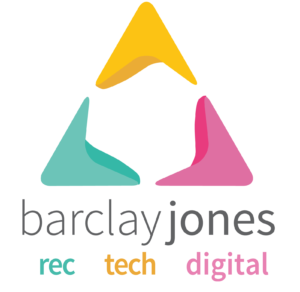Wayne Barclay of Barclay Jones talks to TRN about what 7 KPI’s you need for a new CRM, how to decide if a new CRM is right for you more..

Today’s article is courtesy of our friends at Barclay Jones are award-winning leaders in recruitment training, recruitment technology strategy, and digital marketing strategy for the recruitment industry. They help recruitment leaders, IT leaders and recruitment marketers to set ROI-led goals and use recruitment technology and digital marketing strategically. ROI is key!
Recruitment leaders come to us asking for the secret to choosing “the best” recruitment CRM in the industry. The fact is recruitment businesses have a varied range of tech at their disposal, so the problem lies not in which is the best, but which is the best CRM for your business.
50% of recruitment leaders told APSCo their recruiting technology is a barrier to growth, yet according to LinkedIn, 20% of recruitment agency budgets were spent on recruitment tech in 2017. Why should it be that sometimes it seems that only the recruitment software companies benefit from your CRM purchase?
42% of recruitment leaders are thinking of changing or upgrading their recruitment software this year and there are lots of considerations to drive this decision. Cost is clearly important, but it should not be the main driver.
I’ve been in recruitment tech since 2000 so I have a few “secrets” to successfully selecting the correct technology – and cost is rarely a defining factor when, if a system can improve placement rates by just per recruiter per year, the system would more than pay for itself.
Seven Secrets to Successfully Selecting the Best Recruitment CRM
- Management Information (MI) – Grade how great the reporting is, or leave it to MI5 to create a dossier on your recruiters’ effectiveness.
- Training – Who needs it? What’s the point in training your team? They can figure it out for themselves and keep their workflows and data secret. Or you could opt for a CRMFirst culture, and choose a training supplier who offers more than simply becoming an expert on their system. Your goal is to create recruiting experts, not just systems drones.
- Support – Will you have access to a team of experts who have a proven track record of responding quickly and effectively to a user query, or if something goes wrong? Or is the support team like “the Russians” and will it just smile glibly at your issue?
- CRM Improvement Roadmap – Will your supplier give you access to theirs so you can plan for improving your business, or do they class it as secret as the Death Star plans? Look for transparency, and a track record of delivering on time.
- GDPR and other future legislation – Will your system support you in being compliant? Or will that be a secret hidden feature they unveil a few months down the line (at extra cost)?
- Data – Is it easy and cost effective to migrate your current data across to the new system? Or will you need code-breakers to understand your data after go-live? Data is your new oil and you need access to it to sell it.
- Integrations to improve your workflows and placement rates – Is the CRM future-proof? There’s too much great recruitment tech out there (and being built) for you to miss out on. What’s your supplier like at playing nicely with other suppliers? Or do they keep their cards very close to their chests? Look for a recruiting system that has a history (and a plan) for integrating with others.
The Secret to Choosing a Recruitment CRM
It’s not complicated. Can it help you recruit, or does it turn you into an administrator? Is it your buddy, or your mother? Do you need to be a code-breaker to use it, or is it intuitive? Does it force you to go underground and use other costly systems to source and engage, and thus prevent a CRMFirst culture?
I get a real kick out of working with recruiters, lifting the lid on their workflows and helping to improve them. Systems can and should do this – leaving time and space for more human interaction, calls and meetings.
Takeaways:
You need a recruitment CRM that can:
– Provide you with accurate and relevant MI to help you and your consultants perform effectively
– Come with the right kind of training to help your consultants generate leads, source and place candidates faster (not just press buttons)
– Keep you in touch with a support team that can guide you through any issues or questions
– Provide you with a roadmap so you know what to expect (and when)
– Support you through GDPR (and beyond!)
– Let you migrate your data accurately for minimum disruption
– Integrate with other recruitment tech (current and new)
The above are some great tips to get you thinking about how to select the best Recruiting Software for your business.
Wayne Barclay, Director at Barclay Jones, supports Recruitment Leaders to grow their businesses and improve profitability through effective recruitment technology, recruitment training and digital marketing solutions. He works with recruitment and IT leaders to improve systems, engagement and increase ROI.
- Read more of his recruitment technology blogs here
- Subscribe to the Barclay Jones Recruitment Leaders’ Podcast here
- Subscribe to Barclay Jones’ training videos here
Share :




